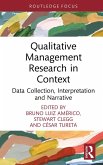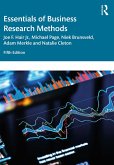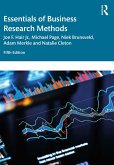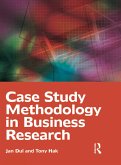Qualitative Management Research in Context (eBook, ePUB)
Data Collection, Interpretation and Narrative
Redaktion: Américo, Bruno; Tureta, César; Clegg, Stewart
21,95 €
21,95 €
inkl. MwSt.
Sofort per Download lieferbar

11 °P sammeln
21,95 €
Als Download kaufen

21,95 €
inkl. MwSt.
Sofort per Download lieferbar

11 °P sammeln
Jetzt verschenken
Alle Infos zum eBook verschenken
21,95 €
inkl. MwSt.
Sofort per Download lieferbar
Alle Infos zum eBook verschenken

11 °P sammeln
Qualitative Management Research in Context (eBook, ePUB)
Data Collection, Interpretation and Narrative
Redaktion: Américo, Bruno; Tureta, César; Clegg, Stewart
- Format: ePub
- Merkliste
- Auf die Merkliste
- Bewerten Bewerten
- Teilen
- Produkt teilen
- Produkterinnerung
- Produkterinnerung

Bitte loggen Sie sich zunächst in Ihr Kundenkonto ein oder registrieren Sie sich bei
bücher.de, um das eBook-Abo tolino select nutzen zu können.
Hier können Sie sich einloggen
Hier können Sie sich einloggen
Sie sind bereits eingeloggt. Klicken Sie auf 2. tolino select Abo, um fortzufahren.

Bitte loggen Sie sich zunächst in Ihr Kundenkonto ein oder registrieren Sie sich bei bücher.de, um das eBook-Abo tolino select nutzen zu können.
This concise book uses narrative fiction to address how researchers can conduct qualitative research using both online and first-hand data and digital and face-to-face methods. The book is structured around four phases of the research process.
- Geräte: eReader
- ohne Kopierschutz
- eBook Hilfe
- Größe: 3.3MB
Andere Kunden interessierten sich auch für
![Qualitative Management Research in Context (eBook, PDF) Qualitative Management Research in Context (eBook, PDF)]() Qualitative Management Research in Context (eBook, PDF)21,95 €
Qualitative Management Research in Context (eBook, PDF)21,95 €![Essentials of Business Research Methods (eBook, ePUB) Essentials of Business Research Methods (eBook, ePUB)]() Joe Hair Jr.Essentials of Business Research Methods (eBook, ePUB)81,95 €
Joe Hair Jr.Essentials of Business Research Methods (eBook, ePUB)81,95 €![Qualitative Research in Sport Management (eBook, ePUB) Qualitative Research in Sport Management (eBook, ePUB)]() James SkinnerQualitative Research in Sport Management (eBook, ePUB)48,95 €
James SkinnerQualitative Research in Sport Management (eBook, ePUB)48,95 €![Essentials of Business Research Methods (eBook, PDF) Essentials of Business Research Methods (eBook, PDF)]() Joe Hair Jr.Essentials of Business Research Methods (eBook, PDF)81,95 €
Joe Hair Jr.Essentials of Business Research Methods (eBook, PDF)81,95 €![Transformative Management Education (eBook, ePUB) Transformative Management Education (eBook, ePUB)]() Ulrike LandfesterTransformative Management Education (eBook, ePUB)39,95 €
Ulrike LandfesterTransformative Management Education (eBook, ePUB)39,95 €![Case Study Methodology in Business Research (eBook, ePUB) Case Study Methodology in Business Research (eBook, ePUB)]() Jan DulCase Study Methodology in Business Research (eBook, ePUB)50,95 €
Jan DulCase Study Methodology in Business Research (eBook, ePUB)50,95 €![Right By Design (eBook, ePUB) Right By Design (eBook, ePUB)]() Ed HenshallRight By Design (eBook, ePUB)33,95 €
Ed HenshallRight By Design (eBook, ePUB)33,95 €-
-
-
This concise book uses narrative fiction to address how researchers can conduct qualitative research using both online and first-hand data and digital and face-to-face methods. The book is structured around four phases of the research process.
Dieser Download kann aus rechtlichen Gründen nur mit Rechnungsadresse in A, B, BG, CY, CZ, D, DK, EW, E, FIN, F, GR, HR, H, IRL, I, LT, L, LR, M, NL, PL, P, R, S, SLO, SK ausgeliefert werden.
Produktdetails
- Produktdetails
- Verlag: Taylor & Francis eBooks
- Seitenzahl: 138
- Erscheinungstermin: 18. August 2022
- Englisch
- ISBN-13: 9781000713121
- Artikelnr.: 65033985
- Verlag: Taylor & Francis eBooks
- Seitenzahl: 138
- Erscheinungstermin: 18. August 2022
- Englisch
- ISBN-13: 9781000713121
- Artikelnr.: 65033985
- Herstellerkennzeichnung Die Herstellerinformationen sind derzeit nicht verfügbar.
Bruno Luiz Américo has a Ph.D. in Management from the Federal University of Espírito Santo, Brazil. Stewart Clegg is Professor in the School of Project Management and the John Grill Institute of Project Leadership at the University of Sydney, Australia. In addition, he holds Visiting Professorship at the University of Stavanger Business School, Norway; the University of Johannesburg Business School, South Africa and Nova School of Business and Economics, Carcavelos, Portugal. In addition, he is an Emeritus Professor at the University of Technology Sydney. César Tureta is Professor of Organization Studies at the Federal University of Espírito Santo, Brazil.
Introduction: 1. Expected learning outcomes
2. The Challenges of Qualitative Research: The Times they are a-changing
3. The changing practice of researching qualitatively
4. The changing realities and contexts investigated by qualitative research
5. Fiction and other styles of writing
6. Ethics in qualitative research
7. The book and its chapters
8. References. Chapter 1: Accessing fieldwork: 9. Expected learning outcomes
10. Introduction
11. A day at the Postgraduate Course
12. The class on access/departure
13. Fifteen days go fast when you are waiting for something
14. Gathering sensitive encounters over coffee
15. Final considerations
16. Questions
.17 Reflective issues
18. References. Chapter 2: Reviewing the literature
developing theory?: 19. Expected learning outcomes
20. Introduction
21. Traveling
searching and discovering new approaches
22. Describing Jermier's (1985) statements - choices
perspectives
utterances
23. Articles using/citing the analysed text - the statements about Jermier (1985)
24. Final considerations
25. Questions
26. Reflective issues
27. References. Chapter 3: Collecting and Analysing Data from Cartography of Controversies: 28. Expected learning outcomes
29. Introduction
30. Collecting data
31. What are controversies?
32. Choosing a controversy
33. Analysing data
34. The source of the data
35. First moment
36. Second moment
37. Third moment
38. The story of the floats' controversies
39. Act I: Everything appears perfect - but not everything is as it appears to be ...
40. Act II: It is all over now
41. Act III: Lucky shot
42. Final considerations
43. Reflective issues
44. References. Chapter 4: Writing: theorizing aesthetically on inclusion: 45. Expected learning outcomes
46. Introduction
47. A class in two stages
48. Final considerations
49. Questions
50. Reflective issues
51. References. Conclusion: Imagination and Creativity in Qualitative Research: 52. Introduction
53. Facing challenges in enacting qualitative research
54. Creative writing
55. Accessing fieldwork
56. Reviewing the literature
57. Collecting and analysing data
58. Writing reports
59. Final Considerations
60. Active Practicing
61. References. Index.
2. The Challenges of Qualitative Research: The Times they are a-changing
3. The changing practice of researching qualitatively
4. The changing realities and contexts investigated by qualitative research
5. Fiction and other styles of writing
6. Ethics in qualitative research
7. The book and its chapters
8. References. Chapter 1: Accessing fieldwork: 9. Expected learning outcomes
10. Introduction
11. A day at the Postgraduate Course
12. The class on access/departure
13. Fifteen days go fast when you are waiting for something
14. Gathering sensitive encounters over coffee
15. Final considerations
16. Questions
.17 Reflective issues
18. References. Chapter 2: Reviewing the literature
developing theory?: 19. Expected learning outcomes
20. Introduction
21. Traveling
searching and discovering new approaches
22. Describing Jermier's (1985) statements - choices
perspectives
utterances
23. Articles using/citing the analysed text - the statements about Jermier (1985)
24. Final considerations
25. Questions
26. Reflective issues
27. References. Chapter 3: Collecting and Analysing Data from Cartography of Controversies: 28. Expected learning outcomes
29. Introduction
30. Collecting data
31. What are controversies?
32. Choosing a controversy
33. Analysing data
34. The source of the data
35. First moment
36. Second moment
37. Third moment
38. The story of the floats' controversies
39. Act I: Everything appears perfect - but not everything is as it appears to be ...
40. Act II: It is all over now
41. Act III: Lucky shot
42. Final considerations
43. Reflective issues
44. References. Chapter 4: Writing: theorizing aesthetically on inclusion: 45. Expected learning outcomes
46. Introduction
47. A class in two stages
48. Final considerations
49. Questions
50. Reflective issues
51. References. Conclusion: Imagination and Creativity in Qualitative Research: 52. Introduction
53. Facing challenges in enacting qualitative research
54. Creative writing
55. Accessing fieldwork
56. Reviewing the literature
57. Collecting and analysing data
58. Writing reports
59. Final Considerations
60. Active Practicing
61. References. Index.
Introduction: 1. Expected learning outcomes
2. The Challenges of Qualitative Research: The Times they are a-changing
3. The changing practice of researching qualitatively
4. The changing realities and contexts investigated by qualitative research
5. Fiction and other styles of writing
6. Ethics in qualitative research
7. The book and its chapters
8. References. Chapter 1: Accessing fieldwork: 9. Expected learning outcomes
10. Introduction
11. A day at the Postgraduate Course
12. The class on access/departure
13. Fifteen days go fast when you are waiting for something
14. Gathering sensitive encounters over coffee
15. Final considerations
16. Questions
.17 Reflective issues
18. References. Chapter 2: Reviewing the literature
developing theory?: 19. Expected learning outcomes
20. Introduction
21. Traveling
searching and discovering new approaches
22. Describing Jermier's (1985) statements - choices
perspectives
utterances
23. Articles using/citing the analysed text - the statements about Jermier (1985)
24. Final considerations
25. Questions
26. Reflective issues
27. References. Chapter 3: Collecting and Analysing Data from Cartography of Controversies: 28. Expected learning outcomes
29. Introduction
30. Collecting data
31. What are controversies?
32. Choosing a controversy
33. Analysing data
34. The source of the data
35. First moment
36. Second moment
37. Third moment
38. The story of the floats' controversies
39. Act I: Everything appears perfect - but not everything is as it appears to be ...
40. Act II: It is all over now
41. Act III: Lucky shot
42. Final considerations
43. Reflective issues
44. References. Chapter 4: Writing: theorizing aesthetically on inclusion: 45. Expected learning outcomes
46. Introduction
47. A class in two stages
48. Final considerations
49. Questions
50. Reflective issues
51. References. Conclusion: Imagination and Creativity in Qualitative Research: 52. Introduction
53. Facing challenges in enacting qualitative research
54. Creative writing
55. Accessing fieldwork
56. Reviewing the literature
57. Collecting and analysing data
58. Writing reports
59. Final Considerations
60. Active Practicing
61. References. Index.
2. The Challenges of Qualitative Research: The Times they are a-changing
3. The changing practice of researching qualitatively
4. The changing realities and contexts investigated by qualitative research
5. Fiction and other styles of writing
6. Ethics in qualitative research
7. The book and its chapters
8. References. Chapter 1: Accessing fieldwork: 9. Expected learning outcomes
10. Introduction
11. A day at the Postgraduate Course
12. The class on access/departure
13. Fifteen days go fast when you are waiting for something
14. Gathering sensitive encounters over coffee
15. Final considerations
16. Questions
.17 Reflective issues
18. References. Chapter 2: Reviewing the literature
developing theory?: 19. Expected learning outcomes
20. Introduction
21. Traveling
searching and discovering new approaches
22. Describing Jermier's (1985) statements - choices
perspectives
utterances
23. Articles using/citing the analysed text - the statements about Jermier (1985)
24. Final considerations
25. Questions
26. Reflective issues
27. References. Chapter 3: Collecting and Analysing Data from Cartography of Controversies: 28. Expected learning outcomes
29. Introduction
30. Collecting data
31. What are controversies?
32. Choosing a controversy
33. Analysing data
34. The source of the data
35. First moment
36. Second moment
37. Third moment
38. The story of the floats' controversies
39. Act I: Everything appears perfect - but not everything is as it appears to be ...
40. Act II: It is all over now
41. Act III: Lucky shot
42. Final considerations
43. Reflective issues
44. References. Chapter 4: Writing: theorizing aesthetically on inclusion: 45. Expected learning outcomes
46. Introduction
47. A class in two stages
48. Final considerations
49. Questions
50. Reflective issues
51. References. Conclusion: Imagination and Creativity in Qualitative Research: 52. Introduction
53. Facing challenges in enacting qualitative research
54. Creative writing
55. Accessing fieldwork
56. Reviewing the literature
57. Collecting and analysing data
58. Writing reports
59. Final Considerations
60. Active Practicing
61. References. Index.







